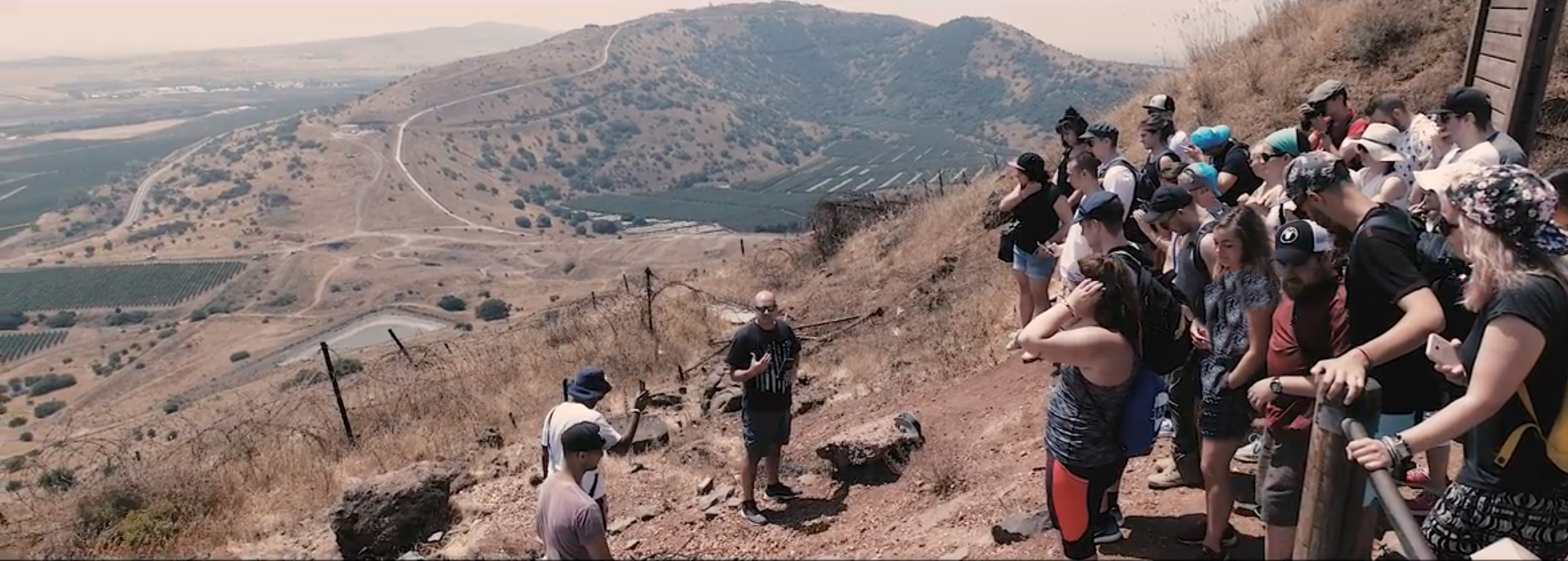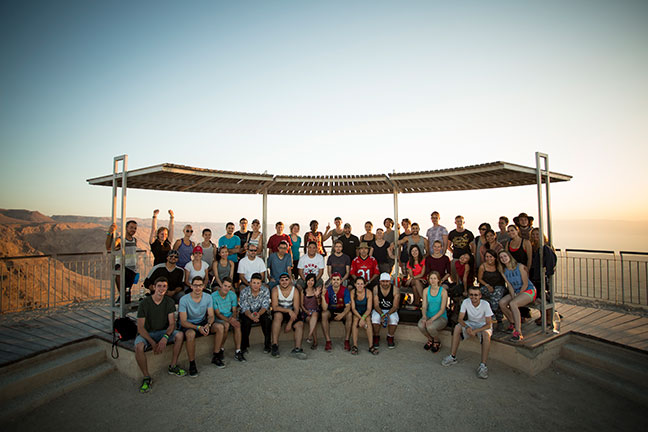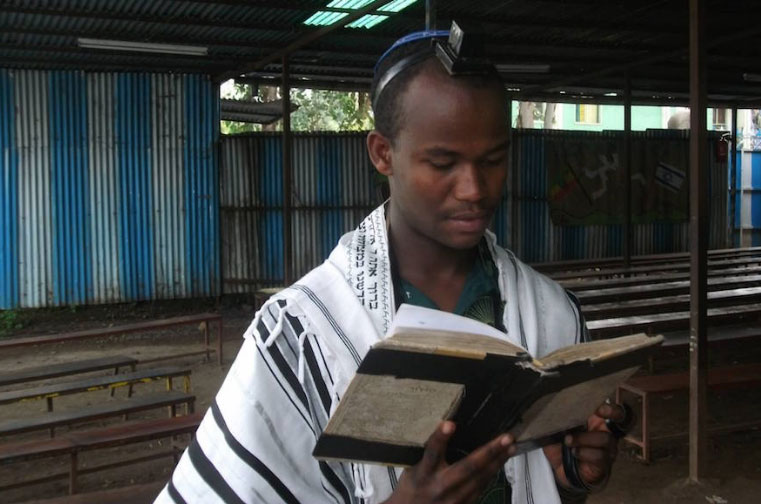Pre-Tour Online Course
What is the Jewish People’s connection to the Land of Israel? How did the modern State of Israel become a reality? What are the Jewish roots of Christianity?
In Part-1 of the course, “The Restoration of Israel”, we will explore key moments and people who have helped shape Israel over thousands of years. Throughout Scripture, Israel is promised a last-day restoration in the land. This promise rests on the faithful character of God, that He can be trusted to carry out His promises. The Restoration of Israel studies track consists of a set of required readings from both the Old and New Testaments, giving the participant an increased understanding of the Jewish roots of our Christian faith, the implications of Scripture as it relates to modern Israel and an increased connection to the Bible from a personal faith standpoint.
* This course is a joint effort of the Israel Impact Tour & Israel Answers (www.israelanswers.com).

Through the Israel Impact Online Course, our intent is that each and every student becomes an articulate ambassador for God’s purposes involving Israel, and an educated spokesperson about issues in the Middle East Conflict.
Becoming Articulate Ambassadors
Many Christians, especially in the United States, are unaware of the acts of discrimination, harassment, and violence against Jews and their homes, schools, cemeteries and synagogues throughout Europe and Canada. This is not surprising since much of the news media writes little about it, and when they do, it is often found in the back of the paper. Many Christians are also shockingly unaware of the anti-Semitism that is happening with even more regularity on many college campuses throughout the United States, Canada, and Europe. The Anti-Defamation League has verified countless incidents of anti-Semitism against Israel and harassment of Jewish students even at many “normal” U.S. colleges, such as the University of California, Colombia University, University of Oregon, University of Denver, University of Colorado-Boulder, San Francisco State University, and Rutgers in N.J., to name a few. It is as if a “politically correct madness” seems to have taken over most North American and European universities, filling campus life with a steady stream of anti-Israel conferences, demonstrations, petitions, debates, and articles.
Why is this gaining such momentum with the young intellectuals of our day?

“As left-wing anti-Semitism rages on French [European and American] campuses under the pretext of anti-Zionism, it turns the Palestinian into an emblematic figure. He replaces the proletarian from the recent past as a symbol of all the oppressed on the planet, [the] spearhead of the struggle against imperialism, capitalism, globalization, and so on.” (Andre Glucksmann is the author of “West Against West,” published in Paris by Plon.)
It doesn’t seem to matter that much of this symbolism is based upon distorted facts, halftruths, and the misuse of language, all used by the media to sell more papers, because very few people are providing any ALTERNATIVE voice on these issues. When Israel does speak out, it is primarily dismissed by the world as defensive and self-serving, so we who understand God’s heart for Israel and the Jewish people must speak out on their behalf. We can no longer be silent . . . we can no longer be indifferent in the face of such political and cultural anti-Semitism. Moral muteness—SILENCE—in a time of war IS a moral stance! It may be a stance born of fear, or a stance born of indifference, or a stance born of cynicism, but whatever its psychological, spiritual, or intellectual origins, to be silent when one should speak. . . to withhold moral clarity in the midst of confusion. . . to withhold truth in the midst of deception. . . is to look at evil and refuse to stop it.
In the following online course sections, we have included topics that are both relevant and often misunderstood, due to either a lack of knowledge or accurate facts. As believers living in a post-Christian world, it is extremely important that we are able to engage in intelligent conversations with nonbelievers about our solidarity with Israel and the Jewish people, and present them with an alternative view in language to which they can relate. We need to do the same with many people inside the Church as well. So often, people do not know the real facts and when we are able to calmly present accurate statistics and information to them that support our position, they usually will listen and their viewpoints can change. If we can discredit just one false belief that they have about Israel with the truth, it then casts doubt upon all of their other false beliefs about Israel, and we begin to change the world around us . . . one person at a time.
What is the Jewish people’s connection to the Land of Israel?
 The Jews are a remarkable people. Consider, for instance, that they are the only people who have been violently uprooted from their homeland not once but twice, only to return to that land each time to re-establish their national sovereignty. You could search far and wide and still not find another people who have managed to do this even once, and yet the Jews have done it twice!
The Jews are a remarkable people. Consider, for instance, that they are the only people who have been violently uprooted from their homeland not once but twice, only to return to that land each time to re-establish their national sovereignty. You could search far and wide and still not find another people who have managed to do this even once, and yet the Jews have done it twice!
Now what makes the Jews all the more remarkable is that they have given us a book which tells us all this was going to happen even before it started to take place. The Bible declares beforehand that there would be two scatterings and two returns of the Jewish people – the first from Babylon and the second from the ends of the earth.
And indeed, this has been the testimony of history. The ancient Israelites were first exiled to Babylon and began to return home some two generations later. Then the Romans forced a second Jewish dispersion out into all nations, where they wandered for nearly 2,000 years before their second return to Eretz Israel in modern times. Over the past 120 years or so, more than 3.5 million Jews have immigrated to the land of Israel from all over the world – from the north, south, east and west, in literal fulfilment of God’s promises like that in Isaiah 43:5-6.
“Fear not, for I am with you; I will bring your descendants from the east, and gather you from the west; I will say to the north, ‘Give them up!’ And to the south, ‘Do not keep them back!’ Bring My sons from afar, and My daughters from the ends of the earth.”
So the Bible is a truly amazing book which tells the story of a remarkable people. It is not a collection of fables and fairy tales. Rather, the Bible is the proven Word of God! And the modern-day return of Israel is proof of its reliability, as well as of God’s faithfulness to His promises and His sovereignty over the affairs of men.
Israelis have adopted a special term from the Hebrew Bible to describe this process of returning to the Land. They call it aliyah, which means “to ascend”. It was used in ancient times in reference to Jewish pilgrims ascending to Jerusalem for the three great biblical feasts of Passover, Pentecost and Tabernacles.
Thus, the process of making aliyah is seen by many Jews as having spiritual meaning as well, beyond just the physical act of returning to their homeland. Many also view it as an act of teshuva (repentance) and return to God. They truly believe He is drawing them back to the land and to Himself.

Takele’s Aliyah Journey
The fate of the last Ethiopian Jews, called the Falashmura, has been some of the most fascinating chapters in modern Jewish history. After some 2700 years an ancient tribe of Israel finally returns to their homeland. But it has also been one of the most difficult chapters and until today, their return to Israel is an Aliyah journey filled with challenges.
The story of Takele is one of many stories of Ethiopian Jews. Takele made this journey at the age of 17, and still remembers the many threats he faced coming to Israel. Like numerous other Ethiopian Jews, he set out from his village on foot along an often-used escape route through Sudan. The month-long journey was dangerous and mostly he walked at night: in a Muslim country like Sudan, Jews if captured, could be killed on the spot. Thankfully he found shelter in a refugee camp in Sudan.

After waiting for an entire year Takele finally made it to Israel. To arrive in Tel Aviv, the modern, technologically-highly advanced city, was shockingly different from his remote village in Ethiopia. Everything was different: the culture, education system, job market, not to mention the language. As a man of faith, Takele was surprised to discover not all Jews were religiously observant. And not all Jewish people were black!
Takele quickly realized he needed an education to survive this new environment, and went on to successfully complete engineering studies and then serve in the Israeli Air Force. Despite his personal success, Takele remained deeply concerned for his community, where many of the new Ethiopian immigrants were not successfully integrating into the society.
Today Takele is one of the many Ethiopian Social workers the ICEJ partners with to assist Ethiopian Jews with their absorption process.

Genia’s Story
Genia was born in Poland in 1923 and was 15 years old when the Germans invaded. She lived at the time with her mother, father, older brother and younger sister.
Her father was immediately taken to a concentration camp and never returned. Her brother fled to the forests to join the Underground. Then her mother was sent to a forced labour camp. This left Genia to look after her little sister and the two were hidden by kind neighbours. About six months later, Genia got word her mother had died and the body was at the regional hospital.
“I travelled to the hospital to look for her and they took me to a big room where there were about 150 Jewish corpses”, she recounted recently. “I looked for my mother and finally discovered she was in a bag on a shelf. I ran home to bring new clothing and to clean and dress her, but when I returned to the hospital the room was completely empty. They told me they had buried everyone in one big grave. Until this day I have no idea where she is buried.”
Genia continued to raise her sister until the war ended and then moved to Israel in 1957. She started a family, but lost her son in one of Israel’s wars. Today, she lives in the Haifa Home.
Source: https://issuu.com/icej/docs/issuu_june_2014_wfj
Jews have maintained a continuous presence in the Land of Israel for more than 3,000 years – a fact that is supported by substantial archeological and historical evidence.
- There was a politically independent Jewish Kingdom from approximately 1000 BC until 586 BC – and from 165 BC until 63 BC, when the Kingdom became a client state of the Roman Empire.
- Roman emperors have long acknowledged Jewish traditions and Jerusalem’s centrality in Judaism. Augustus issued the following edict in 1 BC: “Jews shall use their own customs in accordance with their ancestral law…and their sacred offerings shall be inviolable and shall be sent to Jerusalem; and they shall not [be required to appear] in court on the Sabbath.”
- Jews got their name from their land of origin, Judea. It was not until the Romans expelled many Jews from Israel in 135 AD that they renamed the area Palestine in an attempt to de-Judaize it.
- There is extensive documentation of the Jewish presence in Jerusalem and the Land of Israel.
Jerusalem has been the Jewish people’s capital for more than three millennia.
- There are nearly 700 mentions of Jerusalem in the Hebrew Bible.
- More than a hundred generations of dispersed Jews prayed three times a day to return to Jerusalem.
The sacred texts of both Christianity and Islam confirm the Jewish people’s connection to the Land of Israel.
- The New Testament confirms the Jewish connection to the land in St. Stephen’s sermon in Act 7 and in Hebrews 11.
- “…and said to him, ‘Get out of your country and from your relatives, and come to a land that I will show you.’ Then he came out of the land of the Chaldeans and dwelt in Haran. And from there, when his father was dead, He moved him to this land in which you now dwell.” (Acts 7:3-4)
- “By faith Abraham obeyed when he was called to go out to the place which he would receive as an inheritance. And he went out, not knowing where he was going. By faith he dwelt in the land of promise as in a foreign country, dwelling in tents with Isaac and Jacob, the heirs with him of the same promise.” (Hebrews 11:8-9)
- The Koran refers frequently to Jews and identifies them with Israel and the Promised Land.
- “And thereafter We said to the Children of Israel: ‘Dwell securely in the Promised Land.” (Sura 17:104 The Night Journey).
- The Koran describes Solomon’s construction of the First Temple (Sura 34:13) and recounts the destruction of the First and Second Temples (Sura 17:7).
Jews have been a majority in Jerusalem for the last 150 years.
- The Jewish population was decimated by the Crusaders in the 12th century AD, but it eventually rebounded. By the 1880s, when the Ottoman Empire ruled the city, Jews once again became the largest religious group in Jerusalem. At that time, there were 9,000 Jews and 7,000 Arabs living in the city.
Source: https://www.israelanswers.com/israel/your-questions-answered
Modern-Day Aliyah Highlights // 1882-2014
1882 – The Hovevei Zion (Lovers of Zion) arrive from southern Russia and settle Rishon LeZion (First in Zion).
1904 – A second wave of aliyah begins as pogroms in Czarist Russia escalate.
1924 – Large numbers of Jews begin arriving from Poland in the wake of the government’s anti-Semitic policies.
1933 – The Nazis begin their ascent to power, forcing many German Jews to flee to Mandate Palestine.
1945 – As World War II ends, as many as 400,000 European Jews who survived the Holocaust begin making their way to Israel, some via underground aliyah operations.
1948 – After Israel wins its independence, some 800,000 Jews expelled from Arab lands begin streaming home.
1949 – In Operation Magic Carpet, Yemen agrees to let 45,000 Jews quietly leave on a series of 380 flights on Israeli, British and American planes.
1984 – In Operation Moses, Israel launches an emergency airlift under a strict news blackout of some 8,000 Ethiopian Jews from make-shift camps in Ethiopia and Sudan.
1989 – With the collapse of Soviet communism, over one million Russian-speaking Jews begin arriving in a massive Aliyah from the former Soviet Union.
1991 – In Operation Solomon, Israel airlifts in one weekend nearly 15,000 Ethiopian Jews endangered by civil war, using 34 flights with the seats taken out to accommodate more passengers. The operation still holds the world record for most passengers on a single flight when 1,122 people were packed onto a Boeing 747 aircraft.
2005 – The first flights of the Bnei Menashe community in India arrive in Israel.
2008 – Economic woes and rising anti-Semitism stirs an up-tick in aliyah from the West.
2014 – Unrest in the Ukraine appears to be stirring a fresh wave of aliyah from the North.
What is the significance of the Abrahamic Covenant?
The Abrahamic Covenant has greatly influenced the course of human history, as it was the watershed moment in God’s decision to save the world from sin (Galatians 3:8). The promise is affirmed as an everlasting covenant throughout the Bible (Genesis 17:7-8); Psalm 105:9-12), and the Apostle Paul confirmed that it could never be annulled (Galatians 3:17). Most theologians agree that the covenant was unconditional, although some believe it was conditional upon Abraham showing his willingness to sacrifice his son Isaac (Genesis 22:15-18) – an act that Abraham fulfilled completely. The return of the Jewish people to the Land of Canaan – their everlasting possession – is in fulfillment of the promises contained in the Abrahamic Covenant.
Why is the Land of Promise in the Abrahamic Covenant so important?
- The God of the Bible is the God of the whole earth. Yet, His promise of this one little piece of land to one family – the descendants of Abraham through Isaac and then Jacob – is confirmed and repeated in the scriptures 46 times. Clearly, this attention affirms the importance of the land in God’s purposes. Land is a necessary element for forming a nation, and here it provided an essential foundation for the children of Israel to grow in numbers and build a national identity with national institutions.
- The land also provided a stage on which the Almighty God carried out his plan of world redemption. Since the gifts and callings of God are irrevocable (Romans 11:29), and Israel would never cease to be a nation before Him (Jeremiah 31:36), their possession of this land is also everlasting (Genesis 17:8). Indeed, God’s faithfulness to this Covenant is held up before discouraged believers in the Book of Hebrews as proof that He will be faithful to the promises made to them in the New Covenant (Hebrews 6:13-20).
Important Scriptures to Remember
Romans 15:25-27 “Now, however, I am on my way to Jerusalem in the service of the saints there. For Macedonia and Achaia were pleased to make a contribution for the poor among the saints in Jerusalem. They were pleased to do it, and indeed they owe it to them. For if the Gentiles have shared in the Jews’ spiritual blessings, they owe it to the Jews to share with them their material blessings.”
Ephesians 2:11-13, 3:4-6 “Therefore, remember that formerly you who are Gentiles by birth and called “uncircumcised” by those who call themselves “the circumcision” (that done in the body by the hands of men)—remember that at that time you were separate from Christ, excluded from citizenship in Israel and foreigners to the covenants of the promise, without hope and without God in the world. But now in Christ Jesus you who once were far away have been brought near through the blood of Messiah.”
Romans 11:11-18 “Again I ask: Did they stumble so as to fall beyond recovery? Not at all! Rather, because of their transgression, salvation has come to the Gentiles to make Israel envious. But if their transgression means riches for the world, and their loss means riches for the Gentiles, how much greater riches will their fullness bring! I am talking to you Gentiles. Inasmuch as I am the apostle to the Gentiles, I make much of my ministry in the hope that I may somehow arouse my own people to envy and save some of them. For if their rejection is the reconciliation of the world, what will their acceptance be but life from the dead? If the part of the dough offered as first fruits is holy, then the whole batch is holy; if the root is holy, so are the branches. If some of the branches have been broken off, and you, though a wild olive shoot, have been grafted in among the others and now share in the nourishing sap from the olive root.”
Galatians 3:29 “If you belong to Christ, then you are Abraham’s seed, and heirs according to the promise.”
Q&A: The Restoration of Israel
1. Name six blessings that have come to us as Christians through our Jewish Roots.
2. What are some clear evidences of division you see in the Body of Christ that have come
about through the departure of the Jewish roots of the faith?
3. In one or two sentences, explain Jesus’ position on His Jewish heritage.
4. Explain in your own words why a “Western Worldview” could be a problem in understanding
Christianity.
5. What clear warnings do Romans 11:11-18 give us, as Gentile believers, regarding how we
relate to the Jewish people?
6. Read Romans 11: Give at least three Scripture references that support the truth that
God’s plan for the Jewish people and the nation of Israel is not yet finished.
7. According to Matthew 5:17-18, how ought we as Christians to view the Old Testament
writings?
a. How are the teachings of Moses and the Prophets still absolutely essential to understanding
the nature of God and establishing solid doctrinal foundation in the Church?
b. What will our churches lack if we cease to emphasize the Old Testament teachings
(in correlation with the New)?





